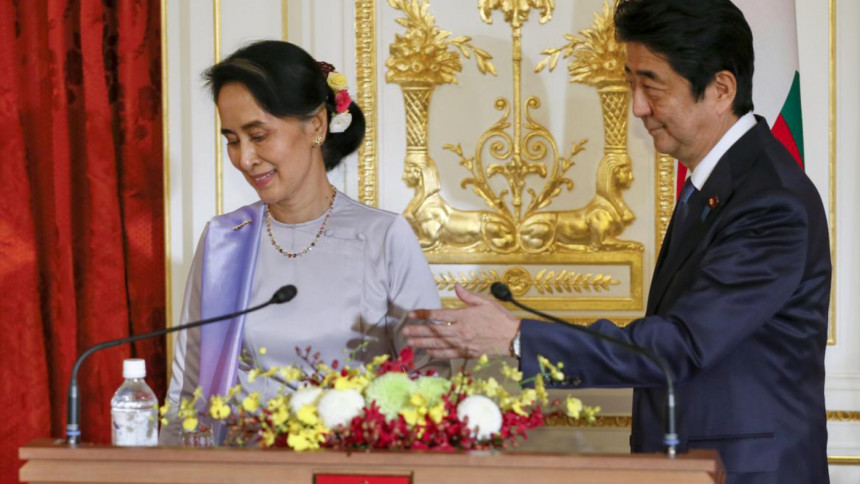Myanmar’s state of perpetual conflict

Report after report have confirmed the wave of appalling violence in Myanmar on its ethnic minorities, perpetrated by a well-trained, well-armed and state-sponsored organisation. Yet the world seems to be incapable of ending this horrifying situation, perhaps unprecedented since the Second World War. Why?
Myanmar is perhaps an ideal battleground for regional supremacy, and Asia's last frontier for plundering natural resources. It has a lot to offer; a strategic location between South and Southeast Asia, common borders with both China and India, a long coast line, abundant natural resources, precious stones and a sparse population. And there is ruling a regime all too eager to join the plunder.
The foremost contender for this much sought-after prize is China, followed by Japan, India and, a distant fourth, Russia. None of these countries have criticised Myanmar for the atrocities carried out by the state, and each has sheltered it from condemnations at the international forums.
China has made good use of the numerous Ethnic Armed Organisations (EAO), especially those along the common border, to keep Myanmar on a short leash. It was the only source of help for Myanmar during its long years of isolation until 2011. The Rohingya situation came as a golden opportunity to further tighten this grip, as Beijing conveniently sheltered the Myanmar regime from scathing international condemnations. It is also flooding the country with mega infrastructure projects under the Belt and Road Initiative (BRI), buying up most of the Jade from its murky mining and trading practices, and keeping the Tatmadaw (Myanmar Armed Forces) happy with large supplies of arms, funds and training.
India maintained a distance from Myanmar's Military-backed government until 1993. Later, strategic and commercial interests—such as fighting insurgency in its restive northeast, transit and easy access to the sea—received greater priority. In 2013 it initiated large scale infrastructure development in and strategic cooperation with Myanmar, partly to counter the growing influence of China. The two countries jointly undertook the Kaladan Multi-Modal Transit Transport Link, a USD 484 million project connecting the eastern Indian seaport of Kolkata with Sittwe seaport in Rakhine State in Myanmar by sea. When completed, it will link Sittwe seaport to Paletwa in Chin State via the Kaladan river route, and then from Paletwa by road to Mizoram state in Northeast India. The project also includes Sittwe Special Economic Zone, Sitwe-Gaya Gas Pipeline, and Thathay Chaung Hydropower Project.
Japan's affair with Myanmar started during the Second World War when it provided military training to the anti-British youths. After the war, Japan continued its engagement with Myanmar through its Overseas Development Assistance (ODA) grants. In 2013, Shinzo Abe made the first official visit to Myanmar by a Japanese prime minister in 36 years and committed USD 5.7 billion for the "Partnership for Quality Infrastructure", in direct competition to China's BRI projects. Major Japanese projects include Thilawa Special Economic Zone, a 2400-hectare industrial area just outside of Yangon that is 49 percent owned by JICA and a trio of Japanese banks. Japanese firms are also developing the USD 1.7 billion Paluzawa coal mine and an associated power plant. Marubeni is a partner in the proposed USD 3.5 billion Myeik coal-fired power plant.
The detailed findings of the Independent International Fact-Finding Mission on Myanmar has only confirmed what was known for a long time. The Tatmadaw seized power in 1962 with the pretext of saving the country from disintegration in the face of ethnic conflicts, but the conflicts have only become more intense and deadly, worsening the human rights situation to a new low, not seen after the Second World War. Tatmadaw reports directly to the National Defence and Security Council led by the President. As such it has become the supreme authority in the country, enjoying total impunity. Using such unbridled power, it has built up an extensive network of commercial entities under two large holding companies; Myanmar Economic Holding Limited (MEHL) and Myanmar Economic Corporation (MEC). MEHL and MEC and their subsidiaries generate revenue that dwarfs that of any civilian-owned company in Myanmar.
Current and former high-ranking Tatmadaw officials, including those accused of some of the gravest crimes under international law, maintain a tight control over the two holding companies and their subsidiaries. All of Tatmadaw's top officers are all part of the boards of MEHL and MEC. There is no regulatory control or oversight as to how these companies operate. Billions of dollars generated through MEC and MEHL bypass formal government channels and remain unaccounted for. Tatmadaw and its officials have a vested interest in armed conflict and violence, because it helps them to justify their stranglehold on this conflict driven resource economy.
Remember the famous saying in Sun-Tzu's Art of War, "In the midst of chaos, there is also opportunity"? In a classic Sun-Tzu style, Myanmar conflicts opened up opportunities for foreign governments and companies willing to reap benefits from this chaos. In return, they are sheltering the Myanmar regime from international condemnations and sanctions. These governments are helping the Tatmadaw in modernising its defence, that serves both their commercial and strategic interests. China, Russia and India are actively supplying Myanmar with arms, transport, equipment and training, as reported by the UN Commission on Myanmar.
Some of the other nations, not to fall behind, are eagerly picking up whatever business is remaining. These include Vietnam, Singapore, Thailand, Brunei, Pakistan, Ukraine, France-Italy (possibly through a third party) and Israel. Earlier this year, frigates from Brunei and Vietnam have paid friendship visits to Myanmar ports, indicating that both want to continue their defence cooperation, regardless of the atrocious state of human rights in the host country or international sanctions. Singapore has recently surpassed China as Myanmar's biggest investor, confirming their continued commercial interest in this lucrative market.
Unfortunately, realpolitik is all about trading, commerce, business, influence and hegemony; more so in today's post-truth world. The unprecedented wave of violence goes on, perpetrated by a well-organised, well-armed and well-trained state organ, protected by some powerful nations, with silent support from some others. Bangladesh is the biggest loser in this power game, second only to the ethnic minorities of Myanmar, as it carries on the burden of a million refugees. The rest of the world choses to remain a passive spectator.
Sayeed Ahmed is a consulting engineer with experience in infrastructure project management in South Asia.


 For all latest news, follow The Daily Star's Google News channel.
For all latest news, follow The Daily Star's Google News channel. 



Comments